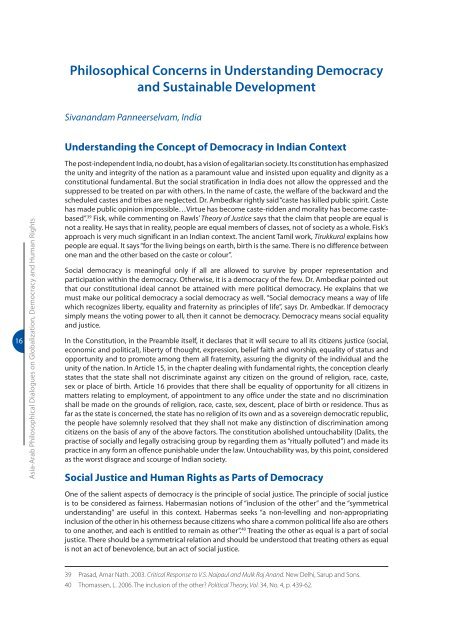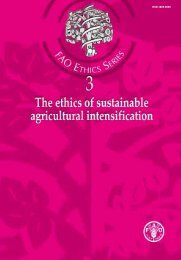Asian-Arab philosophical dialogues on globalization, democracy ...
Asian-Arab philosophical dialogues on globalization, democracy ...
Asian-Arab philosophical dialogues on globalization, democracy ...
You also want an ePaper? Increase the reach of your titles
YUMPU automatically turns print PDFs into web optimized ePapers that Google loves.
Philosophical C<strong>on</strong>cerns in Understanding Democracy<br />
and Sustainable Development<br />
Sivanandam Panneerselvam, India<br />
16<br />
Asia-<str<strong>on</strong>g>Arab</str<strong>on</strong>g> Philosophical Dialogues <strong>on</strong> Globalizati<strong>on</strong>, Democracy and Human Rights<br />
Understanding the C<strong>on</strong>cept of Democracy in Indian C<strong>on</strong>text<br />
The post-independent India, no doubt, has a visi<strong>on</strong> of egalitarian society. Its c<strong>on</strong>stituti<strong>on</strong> has emphasized<br />
the unity and integrity of the nati<strong>on</strong> as a paramount value and insisted up<strong>on</strong> equality and dignity as a<br />
c<strong>on</strong>stituti<strong>on</strong>al fundamental. But the social stratificati<strong>on</strong> in India does not allow the oppressed and the<br />
suppressed to be treated <strong>on</strong> par with others. In the name of caste, the welfare of the backward and the<br />
scheduled castes and tribes are neglected. Dr. Ambedkar rightly said “caste has killed public spirit. Caste<br />
has made public opini<strong>on</strong> impossible…Virtue has become caste-ridden and morality has become castebased”.<br />
39 Fisk, while commenting <strong>on</strong> Rawls’ Theory of Justice says that the claim that people are equal is<br />
not a reality. He says that in reality, people are equal members of classes, not of society as a whole. Fisk’s<br />
approach is very much significant in an Indian c<strong>on</strong>text. The ancient Tamil work, Tirukkural explains how<br />
people are equal. It says “for the living beings <strong>on</strong> earth, birth is the same. There is no difference between<br />
<strong>on</strong>e man and the other based <strong>on</strong> the caste or colour”.<br />
Social <strong>democracy</strong> is meaningful <strong>on</strong>ly if all are allowed to survive by proper representati<strong>on</strong> and<br />
participati<strong>on</strong> within the <strong>democracy</strong>. Otherwise, it is a <strong>democracy</strong> of the few. Dr. Ambedkar pointed out<br />
that our c<strong>on</strong>stituti<strong>on</strong>al ideal cannot be attained with mere political <strong>democracy</strong>. He explains that we<br />
must make our political <strong>democracy</strong> a social <strong>democracy</strong> as well. “Social <strong>democracy</strong> means a way of life<br />
which recognizes liberty, equality and fraternity as principles of life”, says Dr. Ambedkar. If <strong>democracy</strong><br />
simply means the voting power to all, then it cannot be <strong>democracy</strong>. Democracy means social equality<br />
and justice.<br />
In the C<strong>on</strong>stituti<strong>on</strong>, in the Preamble itself, it declares that it will secure to all its citizens justice (social,<br />
ec<strong>on</strong>omic and political), liberty of thought, expressi<strong>on</strong>, belief faith and worship, equality of status and<br />
opportunity and to promote am<strong>on</strong>g them all fraternity, assuring the dignity of the individual and the<br />
unity of the nati<strong>on</strong>. In Article 15, in the chapter dealing with fundamental rights, the c<strong>on</strong>cepti<strong>on</strong> clearly<br />
states that the state shall not discriminate against any citizen <strong>on</strong> the ground of religi<strong>on</strong>, race, caste,<br />
sex or place of birth. Article 16 provides that there shall be equality of opportunity for all citizens in<br />
matters relating to employment, of appointment to any office under the state and no discriminati<strong>on</strong><br />
shall be made <strong>on</strong> the grounds of religi<strong>on</strong>, race, caste, sex, descent, place of birth or residence. Thus as<br />
far as the state is c<strong>on</strong>cerned, the state has no religi<strong>on</strong> of its own and as a sovereign democratic republic,<br />
the people have solemnly resolved that they shall not make any distincti<strong>on</strong> of discriminati<strong>on</strong> am<strong>on</strong>g<br />
citizens <strong>on</strong> the basis of any of the above factors. The c<strong>on</strong>stituti<strong>on</strong> abolished untouchability (Dalits, the<br />
practise of socially and legally ostracising group by regarding them as “ritually polluted”) and made its<br />
practice in any form an offence punishable under the law. Untouchability was, by this point, c<strong>on</strong>sidered<br />
as the worst disgrace and scourge of Indian society.<br />
Social Justice and Human Rights as Parts of Democracy<br />
One of the salient aspects of <strong>democracy</strong> is the principle of social justice. The principle of social justice<br />
is to be c<strong>on</strong>sidered as fairness. Habermasian noti<strong>on</strong>s of “inclusi<strong>on</strong> of the other” and the “symmetrical<br />
understanding” are useful in this c<strong>on</strong>text. Habermas seeks “a n<strong>on</strong>-levelling and n<strong>on</strong>-appropriating<br />
inclusi<strong>on</strong> of the other in his otherness because citizens who share a comm<strong>on</strong> political life also are others<br />
to <strong>on</strong>e another, and each is entitled to remain as other”. 40 Treating the other as equal is a part of social<br />
justice. There should be a symmetrical relati<strong>on</strong> and should be understood that treating others as equal<br />
is not an act of benevolence, but an act of social justice.<br />
39 Prasad, Amar Nath. 2003. Critical Resp<strong>on</strong>se to V.S. Naipaul and Mulk Raj Anand. New Delhi, Sarup and S<strong>on</strong>s.<br />
40 Thomassen, L. 2006. The inclusi<strong>on</strong> of the other? Political Theory, Vol. 34, No. 4, p. 439-62.

















